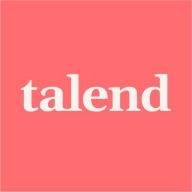

SAP Cloud Platform and Talend Data Integration compete in the category of enterprise integration and data management solutions. SAP has the upper hand with its comprehensive ERP and integration solutions, while Talend stands out for ease of use, especially in complex data processes.
Features: SAP Cloud Platform offers a comprehensive feature set with strong integration and analytics capabilities, enabling multi-environment operations and extensive cloud connectivity with SAP solutions. It stands out for its ability to connect various SAP applications, scalability, and support for analytics tasks. Talend Data Integration is valued for its rich library of connectors, job deployment ease, automated data processes, and flexibility in managing different user and project configurations.
Room for Improvement:SAP Cloud Platform could improve by addressing high pricing and rigid structures that limit appeal to smaller businesses. Better integration with non-SAP tools and enhanced data processing would be beneficial. Talend could improve its interface for more intuitive use and provide better support for real-time data processing. Pricing adjustments could make Talend more accessible to smaller companies.
Ease of Deployment and Customer Service: SAP Cloud Platform deployment can be complex due to intensive training and integrations, but offers reliable, though inconsistent, technical support. Talend provides simpler deployment, especially for mid-sized businesses, with straightforward processes. Its support needs improvement in responsiveness and proactive assistance.
Pricing and ROI: SAP Cloud Platform is costlier, reflecting its extensive features for enterprise-scale operations, sometimes prohibitive for smaller organizations, but larger enterprises may see significant ROI. Talend, while considered pricey, is often seen as more affordable and provides good ROI, particularly by streamlining data management tasks.
Top management buy-in is crucial, and conducting an ROI analysis is essential before adoption to ensure the investment aligns with value.
Orders are managed online, integrated with S/4HANA, reducing chances of fraud or communication errors in processes like purchase orders and sales.
In the last three to four years, whatever we have invested, we have received two to three times back from our investment.
It has helped us save a lot of time by automating repetitive data processes and reducing manual interventions.
They didn't want to use separate ETL tools for MDM or for TMC and data preparation, which is all included in one package.
The availability of knowledgeable support to the implementation partners and the customers could be better.
I rate the technical support as ten out of ten because there is often a need for continuous technical support.
Regarding support, whenever we are creating a ticket for any problem, we want the solution immediately at the earliest.
The support team is responsive when we raise issues, and they usually provide clear guidance or solutions.
The customer support for Talend Data Integration is very good; whenever I raise a ticket in the customer portal, I immediately receive an email, and follow-up communication is prompt.
On a scale of one to ten, I'd rate its scalability at nine and a half to ten.
SAP Cloud Platform is most suitable for various business needs, allowing easy expansion.
By using features like job parallelization and modular design, we can expand our data flows without having to rebuild everything.
The scalability of Talend Data Integration is good; if it weren't scalable, it wouldn't be reliable.
If the databases are accurately managed, the solutions and processes are performed quickly and efficiently.
Earlier, we had individual applications, but now everything is migrated to SAP, and it's all on a single platform, making it easier for management to make timely decisions.
SAP Cloud Platform is pretty stable, although there are occasional rare glitches.
Once the jobs are properly designed and deployed, they run reliably without major issues.
Allowing more third-party applications to be integrated into the cloud platform would make it easier for customers to adopt SAP Cloud Platform.
SAP Cloud Platform should improve on integrating third-party applications with S/4HANA.
In 2024, we will have migrated to S/4HANA through RISE with SAP.
It would be great to have more ready-to-use connectors for modern cloud and SaaS platforms.
Talend Data Integration can be improved by reducing the license cost, as it is a bit high compared to other tools, which can be a burden for small-scale companies wanting to buy a license.
Regarding ETL, Talend Data Integration is great, but concerning real-time data processing, people are not really sure about Talend Data Integration or might not know how it provides such types of flexibilities.
SAP is competitive compared to other enterprise solutions like Oracle, though not necessarily cheap.
The cost for SAP Cloud Platform is high as the server is expensive.
Whatever we want to purchase, it is in lakhs of rupees or crores only.
My experience with Talend Data Integration's pricing, setup cost, and licensing is that it is a bit higher compared to other tools, making it not very affordable.
The main benefits of the SAP Cloud Platform for us are that earlier we had the primary data center at our place, but now we have shifted to the cloud.
It converts CapEx into OPEX due to its SaaS model.
The most proficient feature of SAP Cloud Platform is integration for data services linked with Fiori apps.
By automating daily data loading processes, we reduced manual effort by around three or four hours per day, which saved roughly 60 to 80 hours per month.
Flexibility is a key feature I appreciate about Talend Data Integration, especially the integration of Java within it and the ease of integrating with multiple source repositories such as GitHub and Bitbucket.
The best feature of Talend Data Integration is its multiple data DB components; we have almost all the components and also cloud versions, with TMC allowing us to perform data preparation and data stewardship.
| Product | Market Share (%) |
|---|---|
| SAP Cloud Platform | 6.1% |
| Talend Data Integration | 1.4% |
| Other | 92.5% |


| Company Size | Count |
|---|---|
| Small Business | 15 |
| Midsize Enterprise | 7 |
| Large Enterprise | 25 |
| Company Size | Count |
|---|---|
| Small Business | 2 |
| Midsize Enterprise | 2 |
| Large Enterprise | 4 |
SAP Cloud Platform is an integration platform as a service (iPaaS) and PaaS cloud tool. It powers applications that deliver real-time insights to contribute to more effective and timely decision-making. Customers all over the world from different-sized companies use SAP Cloud Platform to build application extensions, integrate landscapes, or extend existing enterprise applications in the cloud.
The platform incorporates innovative technologies, including big data, Internet of Things (IoT), artificial intelligence (AI), and machine learning (ML). SAP Cloud Platform supports native services and products by SAP, as well as partners with popular platforms such as Microsoft Azure, Google Cloud Platform, Amazon AWS, and Alibaba Cloud.
Users of the product can extend, integrate, and develop applications on premises and in the cloud. The product offers flexibility, agility, and scalability, as it enables easy integration and connection of different applications within the platform. The solution is based on open standards and provides a wide range of development tools.
SAP has announced that they are removing SAP Cloud Platform as a brand name and moving its capabilities within SAP Business Technology Platform (SAP BTP). The features of SAP Cloud Platform will be integrated into SAP BTP to assist with data management and analytics, alongside other components of the platform. Existing customers of SAP Cloud Platform will continue to benefit from its products under SAP Integration Suite and SAP Extension Suite.
SAP Cloud Platform Capabilities
The solution offers a wide variety of tools, application capabilities, services, and application programming interface (API). These can be categorized in the following ways:
SAP Cloud Platform Benefits
The platform has many benefits which improve their client’s workflows. They include the following:
Reviews from Real Users
Shylaraj AK, a senior architect at a construction company, describes SAP Cloud Platform as easy to maintain, great features, and helpful support, which attributes to his high rating for the product.
Ehab-El H., chief executive officer at Asis, likes SAP Cloud Platform because it is easy to use with a fast deployment and straightforward setup.
Talend Data Integration efficiently handles data transformation and integration with ease, supporting complex business needs. It enables seamless data management across all sources.
Talend Data Integration offers a robust platform for managing and transforming data. It connects disparate systems, enabling data flow across various environments. Users benefit from its ability to streamline processes and improve data accuracy. Its user-friendly interface and flexibility make it a preferred choice for data integration experts.
What are the key features of Talend Data Integration?In finance, Talend Data Integration enhances transaction data processing and compliance reporting. In healthcare, it ensures accurate patient data management, while in retail, it optimizes inventory and customer data analysis. Its adaptability makes it valuable across multiple sectors, addressing specific industry requirements.
We monitor all Integration Platform as a Service (iPaaS) reviews to prevent fraudulent reviews and keep review quality high. We do not post reviews by company employees or direct competitors. We validate each review for authenticity via cross-reference with LinkedIn, and personal follow-up with the reviewer when necessary.